- Home
- Tracy Chevalier
Falling Angels Page 22
Falling Angels Read online
Page 22
He still would not look at me. “Finish your porridge, Maude.”
“I’m not hungry. Why have you changed the day of the funeral?”
“Go and change into your new dress, Maude.” Grandmother spoke from the doorway.
I did not move from my chair. “I want to know why you’ve done this. I have a right to know.”
“You have no rights!” my father roared, banging his hand on the table so that coffee slopped from both cups. “Don’t ever let me hear you say that again. You are my daughter and you will do as I say! Now go and change!”
I did not move from my chair.
Daddy glared at me. “Do I have no authority in my own house? Does no one obey me? Has her influence extended so far that my own daughter won’t do as I say?”
I did not move from my chair.
Daddy reached over and knocked my porridge bowl to the floor. It smashed at the feet of the terrified maid.
“Richard,” Grandmother warned. She turned to me, her face more lined than usual, as if she had not slept well. “Your mother’s funeral is to be this morning. We felt it best to have a private service so that it is not taken over by the wrong element. Now, go upstairs and put on your dress. Quickly, now, while I have a word with Mrs. Baker. The carriage will be here soon.”
“I didn’t want it to be taken over by the suffragettes,” Daddy said suddenly. “You saw what happened when she was released from prison—it was turned into a victory celebration. I’m damned if I’m going to let them make a martyr of her. Fallen comrade, they call her. They can go to bloody hell!” He sat back with such a pained look that I could almost forgive him his behavior.
I knew there was nothing I could do, so I ran upstairs. As I passed Mummy’s room—which I had avoided all week, leaving anything that needed doing in there to Grandmother—I could hear tapping. They were nailing the coffin shut.
In my room I dressed quickly. Then it came to me that there was one thing I could do. I found paper and pen and scribbled a note, pausing for a moment to recall the address I had seen printed so often on the letters page of the local paper. Then, grabbing my hat and gloves, I raced downstairs again, passing Daddy and Grandmother’s surprised faces in the front hall as I continued down to the kitchen.
Mrs. Baker was standing by the table, arms crossed, glaring at the spread of food laid out, a large ham glistening with jelly the center-piece.
“Mrs. Baker,” I whispered, “if ever you loved my mother, please find someone to take this immediately. Please, for her sake. As quick as you can, else it will be too late.”
Mrs. Baker glanced at the address, then without a word she strode to the back door and wrenched it open. As I was stepping into the carriage with Daddy and Grandmother I saw her stop a boy in the street and give him the note. Whatever she said to him made him run as if he were chasing his hat in the wind.
It was pouring with rain. The undertaker had spread straw in front of our house to muffle the horses’ hooves, but it was not necessary—the rain drowned out the sound anyway. A few neighbors had seen the funeral carriages and were standing in their doorways, but most were not expecting to do so until the next day.
No one spoke in the carriage. I stared out the window at the passing houses, and then the long brick-and-iron fence that separated graves from the road. The carriage ahead of us with the glass sides carrying the coffin was splashed with rain. All along the route people took off their hats for a moment as we passed.
At the cemetery Mr. Jackson stepped up to the carriage with a large umbrella and helped down first Grandmother and then me. He nodded at me briefly, and I managed to nod back. Then he led us through the gate to the chapel entrance, where Auntie Sarah was waiting for us. She was twelve years older than Mummy and lived in Lincolnshire. They had not been close. She pecked me on the cheek and shook Daddy’s hand. Then we went into the chapel for the service.
I sat in the front pew between Daddy and Auntie Sarah, with Grandmother next to Daddy. At first it was just the four of us and the vicar of St. Anne‘s, who led the service. But when we began the first hymn, I heard voices behind me joining in to sing “Nearer My God to Thee,” and turned to see Mr. Jackson and Simon standing at the back.
Just as we’d finished the second hymn, “Abide With Me” (which of course Mummy had detested), the door banged open. Caroline Black stood in the doorway, breathing heavily, her hat askew, her hair tumbling down. Daddy stiffened. “Damn her,” he muttered. Caroline Black took a seat halfway up the aisle and caught my eye. I nodded at her. When I turned back to face the front I could feel Daddy’s fury next to me, and I smiled a little and lifted my chin, as Mummy used to do when she was being defiant.
Damn you, I thought. Damn you yourself.
When it was all done—when the coffin had been taken into the cemetery and laid in the grave with the gigantic urn looming over it; when Simon and his father began to fill it in, working steadily in the pouring rain; when I stepped away from my mother to begin the journey home—Caroline Black reached over and took my hand. It was then that I at last began to cry.
Dorothy Baker
The waste of all that food was a crime. She didn’t even apologize—just said there had been a change in plans and there would be just four for the funeral meal. And there was me preparing for fifty!
I nearly walked out then and there, but for Miss Maude. In a week she’s lost her mum and Jenny—and her best friend, from what the Waterhouses’ char says. She doesn’t need me leaving too.
Simon Field
What happens today I’ll never tell Maude. Probably won’t tell no one.
After Kitty Coleman’s funeral our pa and Joe and me start filling the grave. The soil’s sandy, makes it hard to shovel much in at once, even in the rain. It’s always harder digging in the meadow, in the sand. Clay needs more cutting with the spade, but it sticks together so you can handle it easier than sand.
We been real careful with this grave, it being so close to Ivy May’s. It’s twelve feet deep, so Maude and her pa and gran can fit in when their time comes. We done extra shoring and made sure the wood were tight as we could get it against sand. Sand can be a killer if it ain’t handled right.
We’re shoveling in the sand awhile, and the grave’s half full. It’s chucking down rain and we’re soaked. Then our pa’s cap falls in.
“I’ll get it,” I says to our pa.
“Nah, son, I’ll get it,” he says, and jumps right in like he’s a boy again. Lands straight on his cap and starts to laugh. “Bull‘s-eye,” he says. “You owe me a pint.”
“Where you going to get a pint?” I laugh. “You’ll have to walk a long way for it.”
Only pub round here that’ll serve gravediggers is the Duke of St. Albans the bottom of Swain’s Lane, and they won’t let our pa in anymore ‘cause he got so drunk he tried to kiss the landlady, then wrecked a chair.
Just then there’s a crack and the shoring on the side by Ivy May’s grave pops out. It does that when the ground round it’s shifting. Before our pa can do anything but duck the flying wood, that side of the grave collapses.
It must happen fast, but it don’t seem like it. Seem like I got lots of time to watch our pa look up like he’s just heard thunder overhead and is waiting for the next flash of lightning. “Oh,” I think I hear him say.
Then the dirt is raining down on him, piling round him up to his waist. There seems to be a little pause then but it can’t be long‘cause Joe and I ain’t moved at all yet, ain’t said a word, ain’t even breathed.
Our pa catches my eye for a second and seems to smile at me. Then a pile of dirt comes down and knocks him over.
“Man in!” I shout as loud as I can through the rain. “Man in!” It’s words no one likes to hear in this place.
The dirt is still moving like it’s alive but I can’t see our pa now. Just like that he’s not there. Joe and I scramble round the grave, trying to keep from setting off more dirt. The hole’s three quarters full now. We need
a big timber or ladder to lay‘cross the hole, to give us something stable to work from, but there ain’t one around. We had a ladder but someone’s borrowed it.
There ain’t no time to wait when a man’s buried like that. He’ll die in a few minutes if he ain’t got no air. I jump into the hole though I’m not supposed to, landing in the mud on all fours like a cat. I look and look and then I see the thing our pa taught me. I see his finger sticking out the dirt, just the tip of it, wiggling. He remembered to put his hand up. I start clawing round the finger with my hands. Don’t dare use a shovel. I dig so hard the sand gets jammed under my nails and it hurts bad.
“Hang on, our Pa,” I say as I’m digging. “We’re getting you out. I see your fingers. We’re getting you out.”
Don’t know as he can hear me, but if he can it might make him feel better.
I’m digging and digging, trying to find his face, hoping he put the other hand up to it. There ain’t no time, not even to look up. If I did look up, though, I know I’d see Joe standing on the edge of the grave, looking down at me, hands at his sides. He’s a big man, and can dig for hours without stopping, but he’s no thinker. He don’t do the delicate work. He’s better off up there.
“Joe, start counting,” I say as I keep clawing at the sand. “Start from ten and keep counting.” I reckon I’ve dug ten seconds.
“Ten,” Joe says. “‘Leven. Twelve.”
If he gets to two hundred and I ain’t found our pa’s face it’ll be too late.
“Thirty-two.”
“Sixty-five.”
“One twenty-one.”
I feel something overhead and look up. There’s a ladder ‘cross the grave now. If more dirt comes down I can reach up and grab hold of the rungs so it don’t get me. Then someone jumps into the grave beside me. It’s Mr. Jackson. He reaches out with his arms wide and hugs the pile of dirt I been digging. I didn’t think he were that strong but he shifts the pile back so I got more room. He do just what I need him to do without me having to say it.
“One seventy-eight.”
My fingers touch something. It’s our pa’s other hand. I dig round the hand and find his head, then dig round that and lift his hand so his mouth and nose are clear. His eyes are closed and he’s white. I put my ear up to his nose but don’t feel breath tickle it.
Then Mr. Jackson pushes me aside and puts his mouth over our pa’s like he’s kissing him. He breathes into his mouth a few times, then I see our pa’s chest go up and down.
I look up. Round the grave, all silent and still, there’s a circle of men standing—other diggers, gardeners, masons, even dung boys. Word got out fast and everybody came running. They’ve all took their caps off, even in the pouring rain, and are watching and waiting.
Joe’s still counting. “Two twenty-six, two twenty-seven, two twenty-eight.”
“You can stop counting, Joe,” I says, wiping my face. “Our pa’s breathing.”
Joe stops. The men all move, shifting feet, coughing, talking tow—everything they held back while they was waiting. Some of ‘em don’t like our pa for his love of the bottle, but no one wants to see a man caught down a grave like that.
“Hand us a spade, Joe,” Mr. Jackson says. “We’ve got a lot of work to do yet.”
I never been down a grave with Mr. Jackson. He ain’t so handy with a spade as me or other diggers but he insists on staying there with me till we get our pa out. And he don’t tell the other men to get back to work. He knows they want to see this through.
I like working side by side with him.
It takes a long time to uncover our pa. We have to dig careful so we don’t hurt him. For a time he has his eyes closed like he’s asleep, but then he opens ‘em. I start talking to him as I’m working so he won’t get scared.
“We’re just digging you out, our Pa,” I say. “The shoring come down with you in the grave. But you covered your face like you taught me, and you’re all right. We’ll be moving you out in a minute.”
He don’t say nothing, just keeps looking up at the sky, with the rain coming down so fast and going all over his face. He don’t seem to notice it. I start to have a bad feeling which I don’t say nothing ‘bout ’cause I don’t want to scare nobody.
“Look,” I says, trying to get him to say something. “Look, it’s Mr. Jackson digging. Bet you never thought you’d see the guvnor digging for you, eh?”
Our pa still don’t say nothing. The color’s coming back to his face but something’s still missing from his eyes.
“Expect I owe you that pint, our Pa,” I say, desperate now. “Expect there’s plenty of men’ll be buying you a pint today. I bet they’ll be letting you back in the Duke of St. Albans. The landlady might even let you kiss her.”
“Let him be, lad,” Mr. Jackson says real soft. “He’s just been through an ordeal. It may take him some time to recover.”
We work without talking then. When at last our pa’s uncovered, Mr. Jackson checks for broken bones. Then he takes our pa in his arms and hands him up to Joe. Joe puts him in a cart they use to haul stones, and two men start pulling him down the hill toward the gate. Mr. Jackson and I climb out the grave, both of us muddy all over, and Mr. Jackson starts to follow the cart. I stand there not sure what to do—the grave’s not filled and it’s our job to do it. But then two other diggers step up and take up the spades. They don’t say nothing—they and Joe just start filling the rest of the grave.
I follow Mr. Jackson and the cart down the path. When I catch up to him I want to say something to thank him, something that connects us so I’m not just another digger. I was close to him in Kitty Coleman’s grave and I want to remind him of that. So I say the thing I know ‘bout him and her, so he’ll remember the connection and know how grateful I am to him for saving our pa.
“I’m sorry ‘bout the baby, sir,” I say. “I bet she were too. She weren’t never the same after that, were she?”
He turns and looks at me sharp like. “What baby?” he says.
Then I realize he didn’t know. But it’s too late to take the words back. So I tell him.
MAY 1910
Lavinia Waterhouse
The first thing I thought when I heard the bells tolling was that they might disturb Mama in her delicate condition. But then, Mama has never been so fond of this king as she was of his mother. His death is of course very sad, and I do feel for poor Queen Alexandra, but it is not like when Queen Victoria died.
I threw open the window to lean out. It should have been raining, or foggy, or misty, but of course it wasn‘t—it was a beautiful May morning, sunny and soft. The weather never does what it ought.
Bells seemed to be ringing everywhere. Their noise was so mournful that I crossed myself. Then I froze. Across the way Maude had opened her window, too, and was leaning out in her white nightgown. She was staring straight at me, and she seemed to be smiling. I almost stepped away from the window, but it would have seemed very rude since she had already seen me. Instead I stayed where I was, and I was rather proud of myself—I nodded at her. She nodded back.
We have not spoken in almost two years—not since Ivy May’s funeral. It has been surprisingly easy to avoid her—we no longer go to the same school, and if I have passed her in the street I’ve simply turned my head and pretended not to see her. Sometimes at the cemetery when I’ve gone to visit Ivy May I’ve seen Maude at her mother’s grave, and then I’ve crept away and gone for a walk till she’s done.
Only once did we come face-to-face in the street. It was over a year ago now. I was with Mama and she with her grandmother and so it was impossible to avoid her. Maude’s grandmother went on and on giving her condolences to Mama while Maude and I stood there gazing at our shoes, not a word passing between us. It was all terribly awkward. I did manage to glance up at her from time to time, and saw that she was wearing her hair up for everyday now, and had begun wearing a corset! I was so shocked I wanted to say something, but of course I couldn’t. Afterward I made Mama take me
straight out to buy a corset.
I have never said much to Mama about falling out with Maude. She knows we fought, but not why—she would be mortified if she knew it was in part over her. I know she thinks Maude and I are being silly. Perhaps we are. I wouldn’t admit it to Maude but I do miss her. I have not met anyone at the Sainte Union who comes close to being the kind of friend Maude was. In fact the girls there have been rather awful to me, I think because to be honest I am so much prettier than they. It can be a burden having a face like mine—though on balance I prefer to keep it.
I expect my nod at Maude means I have forgiven her.
I went down to breakfast, still in my dressing gown, with a suitably sad face for the King. Mama, however, seemed not to notice the bells at all. She is so big now that she cannot sit easily at the table, and so she was eating a plate of marmalade toast on the chaise longue while Papa read the paper to her. Even as he read out the news Mama was smiling to herself, with a hand resting on her stomach.
“Such sad news,” I said, depositing a kiss on each of their heads.
“Oh, hello, dear,” Mama said. “Would you like to feel the baby kicking?”
Really, it was enough to make me flee the room. It is one thing for Mama to be pleased about the baby, especially at her age, and it is good that she has some color in her cheeks. But she seems to have altogether forgot Ivy May.
Papa smiled at me, though, as if he understood, and for his sake I stayed and managed a bowl of porridge, though I did not feel much like eating.
When I went back upstairs to change, I stood in front of my wardrobe and debated for a long while about what to wear. I knew I should wear black for the King, but just looking at that old merino rag hanging there made me feel faint. Perhaps if I’d still had the lovely silk from Jay’s I would have worn that, but I burned it a year after Ivy May’s death, as one is not meant to keep mourning clothes—they might tempt Fate to make one need to use them again.
Besides, I wanted to wear my blue dress, which I love. It has a special significance—I have been wearing it as often as possible, especially leading up to Mama’s imminent confinement. I want a baby brother. I know it’s silly, but I thought wearing the blue would help. I don’t want another sister—it would hurt too much, and remind me of how I failed Ivy May so miserably. I let go of her hand.

 Girl With a Pearl Earring
Girl With a Pearl Earring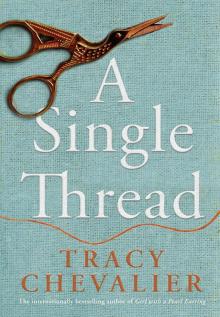 A Single Thread
A Single Thread Reader, I Married Him: Stories Inspired by Jane Eyre
Reader, I Married Him: Stories Inspired by Jane Eyre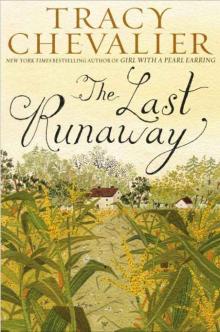 The Last Runaway
The Last Runaway Burning Bright
Burning Bright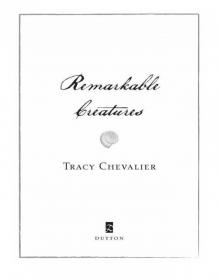 Remarkable Creatures
Remarkable Creatures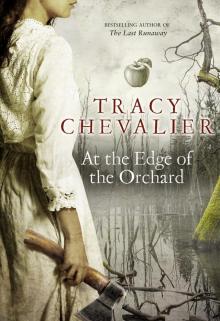 At the Edge of the Orchard
At the Edge of the Orchard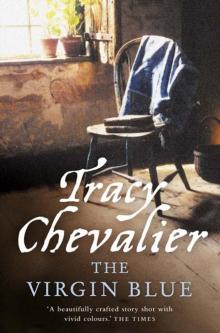 The Virgin Blue
The Virgin Blue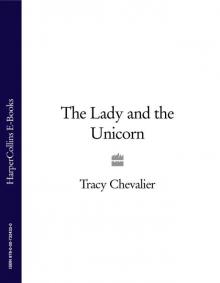 The Lady and the Unicorn
The Lady and the Unicorn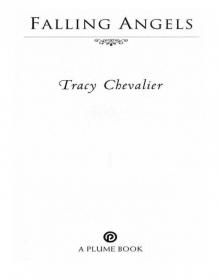 Falling Angels
Falling Angels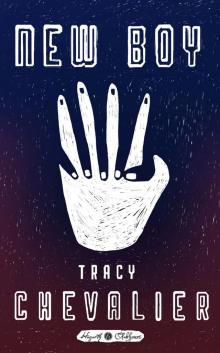 New Boy
New Boy Reader, I Married Him
Reader, I Married Him Girl with a Pearl Earring, The
Girl with a Pearl Earring, The